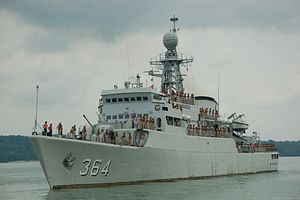Last week, Jakarta was one of the Asian capitals which hosted a commemoration of this year’s anniversary of the founding of China’s People’s Liberation Army (PLA). While the focus was on the occasion itself, the engagement also put the spotlight on the ongoing defense ties between Indonesia and China, which have moved along slowly in spite of the significant challenges that remain.
While Indonesia and China have long had a bilateral relationship, the defense aspect of ties has been strengthened gradually over the past few years in spite of challenges that remain, including with respect to the maritime realm (See: “What’s New About Indonesia’s ‘Push’ for South China Sea Patrols?”). Aspects of collaboration, such as deals on equipment and technology and some exchanges, have been continuing on, and the Indonesian legislature finally ratified the Indonesia-China defense cooperation agreement in 2016 that had been initially inked nearly a decade prior to that.
Last week, the defense relationship was in the headlines again during the commemoration of the 91st anniversary of the founding of the People’s Liberation Army (PLA) in Jakarta on July 25. Though the commemoration was the focus of the engagement, it also provided both sides with an opportunity to offer their thoughts on the status of current collaboration as well as future opportunities to strengthen it.
In his remarks, Vice Admiral Hadiyan Sumintaadmadja, the Indonesian defense ministry’s secretary general, said Indonesia was keen to work with China to ensure maritime security and stability, while predictably leaving out the challenges that both sides continue to face on this front. Notably, he made specific reference to the upcoming ASEAN-China maritime exercise, which has been in the headlines in recent months, as an tangible example of ongoing cooperation between Beijing and Southeast Asian states in this vein (See: “What’s Behind the New ASEAN-China Maritime Exercise?”).
Colonel Zhou Jian, the Chinese embassy’s defense attache, said China was keen to expand defense cooperation with the Indonesian military. He said areas such as defense collaboration on military education and technology had already been “fruitful,” and that there were additional opportunities for both sides to explore as well to add to that.
Zhou did not offer specifics about what exact areas might be the most ripe for expansion in the context of the Indonesia-China defense relationship. In fact, despite some gains in ties, Indonesian officials have also previously been cautious about accepting Chinese requests for some boosts in aspects of defense cooperation.
In spite of these and other realities, as Jakarta and Beijing look to engage across a range of issues through the rest of the year and beyond, this aspect of ties will be an important part of this story amid other wider regional trends as well.
































